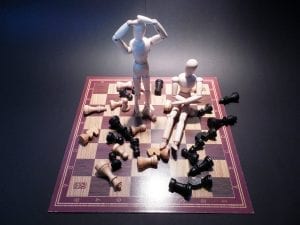Logic, Emotions & How to Look After Your Brain
Sides of the Brain
A favourite topic of psychology is the role of left and right side of our brain in everyday functioning . The right side of the brain is ‘creative’ and home to emotions, intuition, creativity, art and music. On the other hand, the left side of the brain is ‘logical’, where language, reasoning, analysis and maths reign supreme.
So is it better to be Left or Right brain dominant? The answer of course is that it doesn’t really matter. As long as you play to your strengths and fire up either side of the brain when a solution calls for it.
Emotions are “alogical” rather than illogical or logical. They are traits that human beings have evolved as part of flight and fight response.

However, logic is a completely different topic than emotion. We use logic to describe things, figure out problems and gain constructive solutions to challenges in our life. Emotions aren’t logical – just like grapes aren’t logical.
Logic also takes cognitive effort, whereas emotions are far more automatic. Emotions come from a more primitive part of our brain and are felt whether they make sense or not. The ultimate question for us all is whether to act on an emotion, control and temper it or try and dismiss it altogether.
So what does all this mean?
A great deal in an everyday, real world applicable situation. Understanding the brain helps us to be in control of our own journey through life and not just a convoluted product of emotions and their consequences.
Many of us might think that being logical and rational all the time is the best way to get great outcomes, but emotions do play an important part in our health. They alert us to important aspects of what is happening in our surroundings and influence our reactions to certain events. If emotions are directed correctly, they ensure we remain flexible, adaptable, rational positive and solution focused.
This is also true of the more logical and rational side of the brain. There can be a fine line between viewing an event with rational thinking and beliefs, or irrational reactions. Even the great philosopher Epictetus knew how important the emotional consequences of thoughts were. All the way back in 34 AD, he carved the idea that “Life is not about happenings, but what we tell ourselves about those happenings” on a stone tablet.
Every psychologist has an opinion on how best to manage and control emotions, with some more noteworthy than others. The father of cognitive psychology, Albert Ellis co-authored a book called ‘Staying Rational in an Irrational World’. This is a particularly great read, as are his other books – definitely worth a Google!
Thomas Harris wrote another notable book that provides a practical guide to the Transactional Analysis concept of psychology. Called ‘I’m OK – You’re OK’, the book provides a unique approach to problems and methods to staying rational. Sarah Edelman, a clinical psychologist from Sydney also wrote a great book called ‘Change your Thinking’.
So why read these books and writings?
They are primarily aimed at wrestling back control of our brain – both left and right side, so it does what is in our best interest.
Like every professional tennis player needs a great coach (Are you listening Mr Kyrgios?), our brain also needs a great coach who can help it develop and be great at what it wants to do. Fundamentally, that is to propel us towards being the best we can be and interacting constructively with others.

If left to its own devices, both sides of our brain can join forces and quickly take us down a road of anger, irrational premises, impulsivity, lack of fact finding, projection of blame inwards or outwards and push us into a ‘victim role’ or ‘poor me’ trip.
Remember – our brain is a piece of meat up there in our cranium, sloshing backwards and forwards. It needs looking after and training, so it knows what the right thing actually is. We need to develop and grow our brains, so they are a great friend on our journey through life. People who go on this journey with their brains doing as they please may not experience nice outcomes and constantly struggle with the consequences of their impulsive actions.
Emotional Regulation strategies along with Cognitive Behaviour techniques, Acceptance & Commitment strategies as well as Mindfulness are all great ways to wrestle back control of your brain. They take control of thinking, behaviour and your emotional states.
Whenever a ‘life hurdle’ is placed in front of us, we can remain:
Flexible, Adaptable, Rational, Positive and Solution Focused (FARPSing) – yes it is DAMN good for you.




